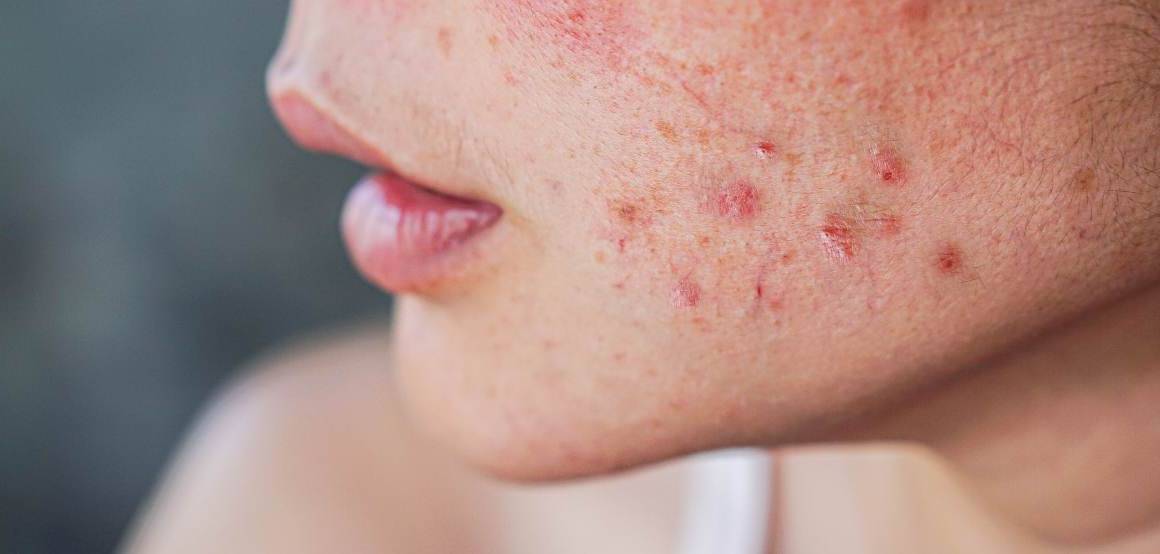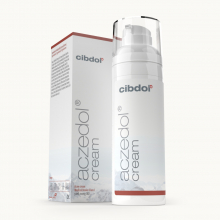Why am I getting bad acne all of a sudden?
Published:
If you are wondering why am I getting bad acne all of a sudden, you're not alone. Many people struggle with sudden acne breakouts in adulthood when they thought their pimple-prone teen years were far behind them.
Contents:
- What Causes Sudden Acne Breakouts In Adults?
- How To Treat Sudden Acne Breakouts
- When To See A Doctor Or Dermatologist
- Takeaway
- What's the difference between adult acne and teen acne?
- Is sudden acne a sign of an underlying health condition?
- Will sudden acne go away on its own?
- How can I prevent sudden breakouts?
- What foods can help clear up sudden acne?
- How long does it take sudden acne to clear with treatment?
- Will I have permanent acne scars from a sudden breakout?
- What ingredients should I look for to treat sudden acne?
- When should I see a dermatologist for sudden acne?
Acne can be frustrating, painful, and make you feel self-conscious. Understanding the common causes of adult acne can help you pinpoint what's causing your breakouts so you can get clear skin again.

What Causes Sudden Acne Breakouts In Adults?
There are a few main culprits that can trigger sudden acne breakouts, even if you haven't battled blemishes for years.
Hormones
Hormones are one of the most common acne causes. Hormonal fluctuations related to stress, diet, medications, or major life events can lead to increased oil production, clogged pores, bacteria growth, and inflammation - the perfect recipe for pimples.
Women are especially prone to hormonal acne breakouts related to their menstrual cycles, pregnancy, and menopause. But men's hormones also fluctuate and lead to breakouts.
Stress
High stress levels cause your body to produce excess cortisol and other hormones that overstimulate the oil glands in your skin to produce more sebum. This excess oil clogs pores and allows p. acnes bacteria to thrive, causing inflammatory pimples.
Medications
Certain medications are infamous for causing acne as a side effect. Some medications that can trigger breakouts include:
- Corticosteroids
- Testosterone or anabolic steroids
- Lithium
- Anticonvulsants
- Barbiturates
- Isoniazid
Speak to your doctor if you think a new medication is causing acne. A switch to an alternative could clear your skin.
Diet
Your diet affects your hormone balance, inflammation levels, and overall health. Eating lots of refined carbs, sugar, and unhealthy fats can spike blood sugar and insulin levels. This can over activate oil glands and lead to breakouts.
Not drinking enough water or eating enough fiber also slows bowel movements. Toxins build up and may release through the skin as acne.
Quitting Birth Control Pills
Many women take birth control pills to regulate hormones and keep acne under control. Quitting the pill causes hormone fluctuations that bring back breakouts.
It can take several months for the body to adjust and acne to clear up again after stopping birth control pills.
Product Irritation
Using too many new skin care products at once or one comedogenic (pore clogging) product can suddenly clog your pores and cause a breakout.
Harsh acne products that contain alcohol, fragrances, or strong acids may also irritate and inflame skin. Discontinue use of any suspect products.
Not Removing Makeup
Not properly removing makeup at the end of day leaves oil, dirt, dead skin cells, and bacteria trapped in pores overnight. This leads to blackheads, whiteheads, and inflammatory acne lesions.
Always remove makeup before bed with a micellar water or oil cleanser to avoid clogged pores.
Age
As we age, cell turnover slows down. Dead skin cells and sebum build up in pores faster than the body sheds them. Blackheads and breakouts develop under this debris accumulation.
Using retinol speeds cell turnover to prevent this cumulative buildup of pore-cloggers as you age.
Genetics
Some people are just genetically prone to acne with overactive sebaceous oil glands. You may get a late onset of acne due to hereditary factors, even after years of clear skin.
High Glycemic Diet
Eating lots of refined carbohydrates with a high glycemic index causes your blood sugar and insulin levels to spike. This can trigger increased oil production and breakouts.
Low glycemic whole foods provide a slower, more stable release of energy without the acne-producing blood sugar spikes.
Smoking
Smoking tobacco constricts blood vessels, robbing your skin of oxygen. Toxins in cigarette smoke also damage collagen. This leads to blackheads, breakouts, and premature aging.
Oils, Sweat, and Bacteria
Oily skin types are prone to acne since excess sebum combines with dead skin cells to clog pores.
Sweating while wearing non-breathable fabrics or not showering after exercise traps sweat, oils, and bacteria against the skin, leading to body breakouts on the back, chest, and shoulders.
Sunscreen
Some chemical sunscreen ingredients like oxybenzone can clog pores and cause acne for acne-prone skin. Switch to a mineral sunscreen with zinc oxide or titanium dioxide.
Face Masks
Wearing thick, occlusive face masks repeatedly causes "maskne" breakouts by trapping oils, bacteria, and sweat against the skin for prolonged periods.
How To Treat Sudden Acne Breakouts
If you’re wondering why am I suddenly breaking out in acne, don’t worry - with the right skincare routine and remedies, you can get breakouts under control fast. Here are tips.
Cleanse regularly
Washing your face at least twice daily removes excess oil, makeup, dead skin cells, and bacteria that clog pores. Use a sulfate-free cleanser suited to your skin type.
Exfoliate
Gently exfoliating 2-3 times a week dislodges the "glue" between dead skin cells to prevent pore blockages. Try a BHA or AHA exfoliant.
Use retinoids
Retinoids like prescription Retin-A or over-the-counter retinol increase skin cell turnover to prevent dead cell buildup in pores. They also reduce oil production.
Spot treat
Dot on benzoyl peroxide, salicylic acid, or tea tree oil on emerging breakouts to kill acne-causing bacteria.
Hydrate
Using an oil-free, non-comedogenic moisturizer prevents your skin from producing excess oil from dehydration. Hydrated skin also heals breakouts faster.
Take a probiotic
Probiotics balance gut bacteria to reduce skin inflammation. Look for strains like lactobacillus and bifidobacterium.
Try niacinamide
Niacinamide is a form of vitamin B3 that reduces oil and sebum production. It also minimizes acne redness and scarring.
Eat anti-inflammatory foods
Salmon, walnuts, leafy greens, berries, and green tea contain essential fatty acids and antioxidants that reduce acne inflammation.
Avoid irritants
Steer clear of aggressive acne products with alcohol, fragrances, menthol, peppermint, eucalyptus, or lemon. These can worsen irritation.
Monitor medications
If a new medication coincides with your acne, speak to your doctor about switching to an alternative with less risk of breakouts.
Lower stress
Chronic stress increases inflammation hormones like cortisol. Relaxation techniques like meditation, exercise, massage, and sufficient sleep will help control stress levels and acne.
Use a mineral sunscreen
Mineral sunscreens with zinc oxide or titanium dioxide won't clog pores like chemical sunscreen filters. They also soothe inflammation.
When To See A Doctor Or Dermatologist
Mild to moderate acne breakouts can usually be cleared up with over-the-counter skincare products and lifestyle remedies. However, if you’ve had a sudden onset of severe acne, seek medical advice.
See a doctor or dermatologist if you experience:
- Large, red, swollen breakouts
- Cystic acne unresponsive to usual care
- Acne with scarring or dark spots
- Deep painful nodules under the skin
For more severe cases, you may need prescription strength retinoids or antibiotics to get breakouts under control and prevent permanent scarring.
Takeaway
Sudden acne breakouts can be distressing after enjoying years of clear skin. However, by identifying your acne triggers and using the right treatments, you can gain control over surprise pimple flare ups.
Be patient - it may take 6-8 weeks to see results as your skin turnover cycle renews. But sticking to a regular acne care routine will clear up sudden breakouts and restore your naturally beautiful, glowing skin.
What's the difference between adult acne and teen acne?
Teen acne is often caused by puberty and hormonal changes. Adult acne can happen at any age due to stress, fluctuations in hormones, medications, pollutants, cosmetics, and skin care habits. Adult acne tends to form on the lower face along the jawline and neck.
Is sudden acne a sign of an underlying health condition?
Not necessarily. Hormonal shifts, diet, medications, and other factors commonly cause sudden breakouts. But in some cases, it could indicate an undiagnosed condition like polycystic ovarian syndrome or insulin resistance. See your doctor if acne is severe.
Will sudden acne go away on its own?
Maybe, but it's best to treat it. Mild cases may resolve after a hormonal fluctuation ends or adjusting skin care. But moderate to severe sudden acne requires treatment to avoid scarring. Over-the-counter and prescription remedies can clear sudden breakouts.
How can I prevent sudden breakouts?
Wash face twice daily, avoid irritants, moisturize, avoid touching or popping pimples, change pillowcases frequently, don't pick at skin, reduce stress, avoid smoking, and eat a balanced anti-inflammatory diet. See a dermatologist if breakouts are severe or don't improve.
What foods can help clear up sudden acne?
Foods high in omega-3 fatty acids like salmon, walnuts, chia and flax seeds have anti-inflammatory effects to calm breakouts. High fiber fruits, vegetables, whole grains, probiotics and green tea also promote clear skin. Avoid high glycemic index carbs.
How long does it take sudden acne to clear with treatment?
With proper acne treatment, you should see initial clearing after 6-8 weeks. More improvement will follow over 2-3 months. Severe cystic acne may take 4-6 months to fully clear. Be patient and consistent with your regimen. See a dermatologist if not improving.
Will I have permanent acne scars from a sudden breakout?
The longer acne persists, the higher the risk of scarring. To minimize scarring from a sudden breakout, do not pick or pop pimples, treat acne early, use retinoids to increase skin cell turnover, and always apply sunscreen. See a dermatologist for scar treatment options.
What ingredients should I look for to treat sudden acne?
Benzoyl peroxide, salicylic acid, sulfur, niacinamide, retinoids, and tea tree oil can effectively clear sudden acne breakouts. Avoid irritants like alcohol, menthol, peppermint, fragrances, and lemon juice.
When should I see a dermatologist for sudden acne?
See a dermatologist if OTC treatments haven't cleared acne after 2-3 months, if you develop large red nodules or cysts, experience scarring, or have an underlying condition like PCOS worsening acne. A dermatologist can prescribe stronger medications to get breakouts under control.










